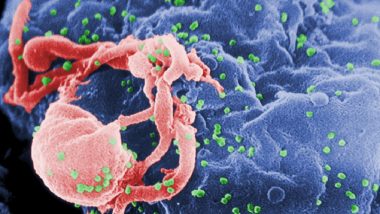Toronto, March 6: In what could be a turning point in the treatment of HIV+ positive patients, a man’s HIV infection has gone into remission after he received a blood stem cell transplant in 2016.
The patient was able to stop taking antiretroviral drugs, with no sign of the virus returning 18 months later after he received a stem cell transplant from a person who is resistant to the HIV virus.
The London patient, whose name has not been disclosed is only the second person to receive such a transplant and consequently be free of the HIV virus. Currently, treatments for HIV+ patients extends to containing the virus and prevent the onset of AIDS.
The London patient was initially being treated for Hodgkin’s cancer and was undergoing chemotherapy, a form of cancer treatment. He was also found to be HIV+ for which a stem cell transplant was recommended. Stem cells were then implanted into the patient from the donor after which both his cancer and HIV virus showed a remission.
Four British universities – University College London, Imperial College London, Cambridge and Oxford Universities were involved in the case.
This patient was given a treatment which was first attempted over ten years ago in Berlin, Germany. Timothy Brown, who was suffering from leukaemia commonly known as blood cancer, and was diagnosed to be HIV+ became the first person to "beat" HIV/Aids, as he was given two bone marrow transplants from a donor resistant to HIV and total body radiotherapy. Read: Another Cure for Cancer? ‘Trojan Horse’ Drugs Claims to Kill 6 Types of Cancer Cells
Brown remains HIV free till date. "By achieving remission in a second patient using a similar approach, we have shown that the Berlin patient was not an anomaly and that it really was the treatment approaches that eliminated HIV in these two people," said lead study author Prof Ravindra Gupta, from UCL.
However, this treatment is not considered feasible for most patients as finding a stem cell match with a person who has a gene defect which prevents the HIV virus from duplicating in the body, is extremely rare and hence difficult to execute. But as the two patients have shown, it does offer a rare hope in a world which has none.
(The above story first appeared on LatestLY on Mar 06, 2019 01:08 AM IST. For more news and updates on politics, world, sports, entertainment and lifestyle, log on to our website latestly.com).













 Quickly
Quickly


